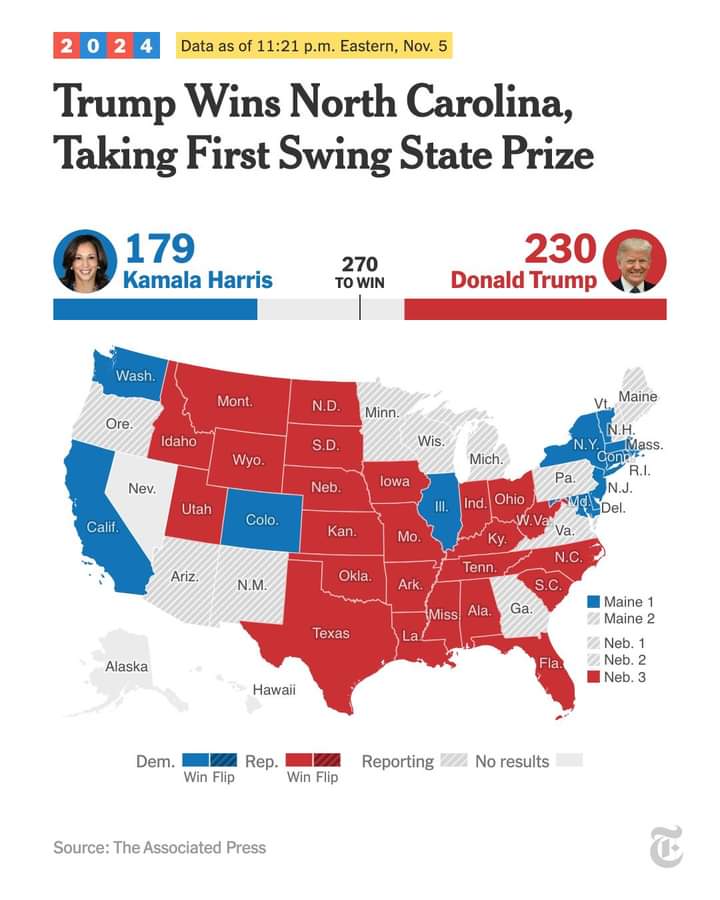FORMER President Donald J. Trump has won North Carolina, the first swing state to be called, narrowing Vice President Kamala Harris’s path to victory in the Electoral College.
Republicans have secured control of the Senate with crucial wins: Bernie Moreno in Ohio, Jim Justice in West Virginia and Deb Fischer, who held on to her seat in Nebraska.
But for the first time in history, the Senate will have two Black women serving simultaneously: Lisa Blunt Rochester in Delaware and Angela Alsobrooks in Maryland, both Democrats.
The New York Times veteran political correspondent Jonathan Weisman sums up this historic night:
Trump takes the first battleground called.
North Carolina, a state that Donald J. Trump narrowly carried in 2020, was won again by the former president, the first swing state to be called for either candidate in one of the most consequential presidential elections in modern American history.
And Republicans flipped control of the Senate with a string of key victories. In Ohio, Bernie Moreno defeated Senator Sherrod Brown, a resilient red-state Democrat. The retiring Senator Joseph Manchin, an independent, will be replaced by the state’s Republican governor, Jim Justice. And Senator Deb Fischer held off a dark-horse challenge in Nebraska from a blue-collar independent, Dan Osborn, eliminating any path Democrats had toward retaining control of the chamber.
The so-called blue wall states — Pennsylvania, Michigan and Wisconsin — remain too close to call, and data point to very close and competitive contests. Vice President Kamala Harris would almost certainly need to win all three to become the nation’s first woman-elected president.
But with her path to victory narrowing, Mr. Trump took a significant step toward making history as the first president in more than 120 years to return to the White House after being ousted four years before.
Though the election is by no means over, Mr Trump is showing strength across the country, winning states like Texas and Florida easily and defying recent polls, such as one in Iowa, that seemed to show a surge of support for Ms Harris. Republican leaders in Florida were also able to defeat ballot initiatives legalizing abortion and marijuana, both of which failed to reach the 60 per cent they needed.
Republican-held House and Senate seats that Democrats had hoped would at least be close so far have not been. Still, most of the states that will decide the next president were still not decided.
A largely peaceful Election Day was marred by bomb threats that roiled polling places in Democratic regions of Georgia, Arizona and Michigan. Officials said none of the threats appeared to be credible, but at least in Georgia and Arizona, some polling places stayed open later as a result. Election officials in those states attributed at least some of the threats to Russian actors.
The Democrats did score some landmark wins. For the first time in history, the Senate will have two Black women, both Democrats, serving simultaneously: Representative Lisa Blunt Rochester won her Senate contest in Delaware, while Angela Alsobrooks defeated the moderate former governor Larry Hogan in Maryland. Sarah McBride, a Delaware Democrat, will also be the first transgender member of the House.
In the battle for the House, Republicans were holding their own in key races, leaving control up for grabs.
Harris’s path narrows.
Trump has won in North Carolina and is very likely to take Georgia. To win, Harris will probably need to sweep Pennsylvania, Michigan and Wisconsin — but Trump has an advantage in all three.
Credit: The New York Times
Eighteen-Eleven Media


